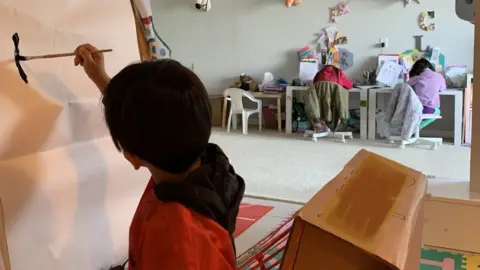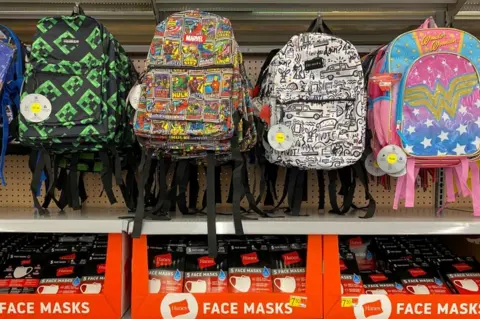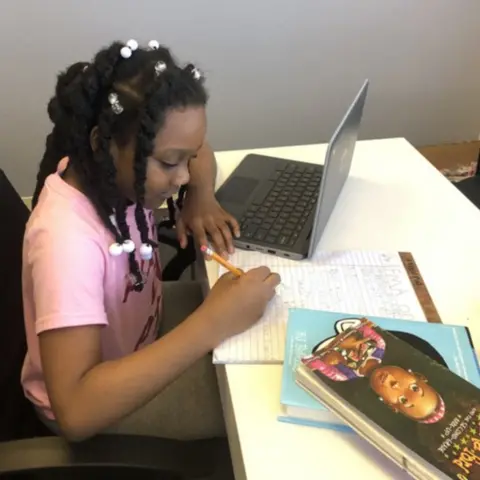Coronavirus: How pandemic pods and zutors are changing home-schooling
 Julie Lam
Julie LamWhen the number of coronavirus cases began to rise in the San Francisco area in early July, mother of one Lian Chikako Chang started a Facebook group to support local families and teachers who were suddenly facing the prospect of schools not opening in person as planned in mid-August.
The "Pandemic Pods" group, which aims to help with childcare and schooling needs, grew to more than 30,000 members within three weeks, as areas across the US were hit by Covid-19 spikes and more schools decided to stay shut.
"Families were left scrabbling for solutions," says Ms Chang. "Most parents have to work, and most jobs are not compatible with home-schooling".
And it's not just Facebook parents are turning to. Matchmaking apps and websites have sprung up offering to help parents connect with other families to form "safe" learning pods, or match them with teachers who can give online lessons, dubbed "zutors" (zoom tutors) by one matchmaking service.
Regular tutoring services have also seen an explosion of interest. One company in Missouri saw a 40% rise in bookings for its online academic subjects across all age groups in April, and is now seeking to add 10,000 more tutors and instructors. But extra teaching does not come cheap, with private tutors costing anywhere between $20 (£15) and $65 (£49) an hour, and monthly fees at around $3,000 (£2,300).
Posts to the Pandemic Pods group range from seeking advice on whether an "outdoor-based" pod of five children, made up of three families, can safely spend some time indoors, to a mother wanting advice on how to manage a "micro-school" timetable for six six-year-olds. One California mother has erected a huge geodesic tent in her back garden and renamed it "Dome School" for a small group of kindergarten-age children.
Julie Lam, CEO of San Francisco-based real estate investment firm Goodegg, realised she needed to make changes for the new school year after her "really terrible" experience trying to work and home-school her three children aged five, seven and eight during the spring term.
"I'm not an educator. I was trying to support each of my three children in their school work each day, trying to work out what they should be doing, trying to work out if they were doing it right, while fielding calls and taking meetings. It's was so stressful," she says.
Unhappy with the input she got from her children's public school, she and her husband decided to move their children to a private school. Although her children will start their new school remotely, Mrs Lam says the support she has received has been "very refreshing". The children can expect a full timetable of study, and she can have a daily check-in with their teachers. Through a matchmaking site, she has also found a college graduate who can come to her house three days a week and help supervise her children's distance learning.
Ms Lam recognises she is in a fortunate position to be able to make these choices. "I didn't grow up with wealth so I don't take it for granted. I think everyone is just trying to do the best they can in these difficult times."
Widening gaps of inequality
Her comments touch on one of the big concerns around the growing popularity of learning pods and private tutors - that it will further widen inequalities in the education system, which have long fallen along race and income lines.
New research suggests the impact of the lockdown is already being seen in students' academic gains. A working paper from the NWEA, a non-profit organisation, predicts the average student will be starting the new school year having lost as much as a third of the expected progress in reading and half the expected progress in maths. Some students are nearly a full year behind where they might expect to be in a normal school year.
 Reuters
ReutersLearning loss is likely to be greater among low-income black and Hispanic students, according to analysis by consulting group McKinsey and Company. It highlights data which shows only 60% of low-income students logging into online instruction compared with 90% of high-income students. Engagement rates were also lagging behind in schools serving predominantly black and Hispanic students, with 60-70% logging on regularly.
Most schools across the US had intended to welcome back students on their premises when the new academic year starts in the coming weeks. But with US Covid-19 cases topping 4.7 million and rising by up to 77,000 a day, they have had to rapidly rethink their plans.
More than half of 106 school districts have now confirmed they will begin remotely, compared with just one two weeks ago.
Bree Dusseault of The Center on Reinventing Public Education (CRPE) says some schools have been able to transition smoothly to online teaching, while others are still trying to organise laptops and internet hotspots for their students.
She says many school districts have not been properly supported at state level, and have been burdened with having to "provide everything for schools as well as ensure health". State intervention would allow for greater consistency when it comes to "device provision, communication hotspots, school meals, mental health and protections for physical health", she says.
A big unknown, she says, is how the country's most vulnerable learners are faring. "Districts are reassuring us that they will provide services, but there has been almost no information about what support is being given to children who are homeless, disabled and in juvenile detention."
Ms Dusseault understands why parents would seek out-of-school support "especially if their district isn't stepping up", but she says "the key is ensuring that all families can find and pay for those solutions if they have to".
"Robust conversations" around equality issues are also heavily discussed in the Facebook groups, says Ms Chang, and some families are actively trying to organise pods that are more equitable.
One public elementary school in San Francisco, Rooftop, decided to "head inequity off at the pass" as head Nancy Bui puts it, by organising a school-wide virtual "pod" programme. This programme "supports family-to-family connections by assigning kids in the same class to smaller cohorts" but ensures the pods reflect the diversity of the school.
'They didn't even know they were learning'
Kellyse Brown's family is one for whom a solution has been found. The lively nine-year-old has spent the summer taking part in a summer school set up and run by a parent-led group in Oakland, California.
Oakland Reach was set up four years ago to help disadvantaged families fight for high quality education for their children. Most of the city's public schools are majority black and Latino, and less than 30% of students were reaching the required reading level. A group of parents decided this had to change.
 Keta Brown
Keta Brown
Co-founder Lakisha Young said it became apparent as soon as the lockdown happened in March that the students of Oakland were likely to be adversely affected and indeed this proved the case, with just 30% of students found to be participating in online learning.
The organisation raised more than $350,000 to pay for 14 teachers and two directors to run a free virtual summer school for 180 children aged between five and 13, for the whole of the six-week summer break.
Kellyse's day starts with a virtual get-together with her classmates and teacher. She will do some maths and English along with an hour of mindfulness and an afternoon of enrichment activities ranging from science experiments to karate and cooking.
Her mother, Keta Brown, who is a family liaison officer with Oakland Reach, says it has been a wonderful experience for her daughter.
"It hasn't felt like work. Their literacy lessons for instance revolved around civil rights and Black Lives Matter - issues that are relevant to them. They didn't even know they were learning," says Keta, who is also delighted that her daughter now knows how to cook pasta.
"I feel so fortunate that Kellyse was able to have this opportunity because so much learning is lost in the summer term, and it's very possible children this year will have backtracked to March."
Oakland Reach is now thinking about how to help families further as the new school year gets under way remotely - and is well supported by both the school district and financial donors in doing so.
Ms Young says that for families who are happy with their school's provision they still want to offer "robust one-to-one tutoring" to supplement children's learning. For other families, they intend to continue providing academic instruction and enrichment - and "setting up parents as the real leaders of their child's education", by providing support to access both the curriculum and the necessary technology.
On the subject of pods, she says: "We would love to partner with them. This crisis has created an opportunity for real innovation and we are open to working with everyone to help make our education system work better for all."
